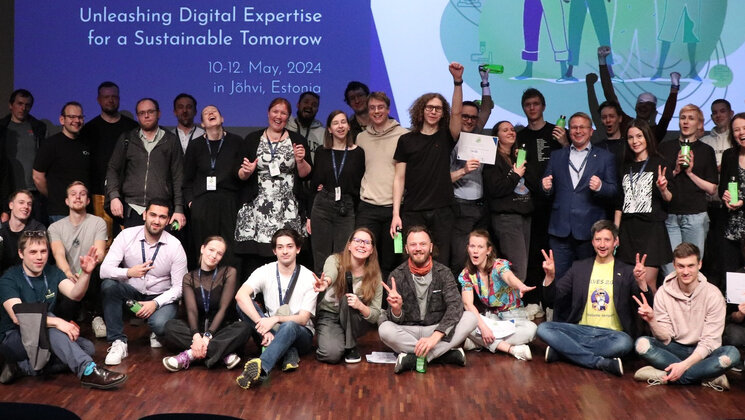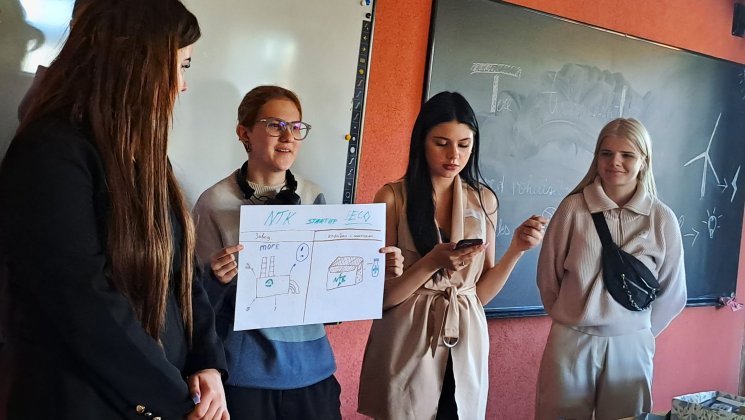University of Tartu supports the work towards the market-readiness of research results with €300,000

In this year's call for applications for the University of Tartu Feasibility Fund grants, nine projects were awarded funding for one-year development work: four in the Faculty of Science and Technology, two in the Faculty of Arts and Humanities, two in the Faculty of Medicine and one in the Faculty of Social Sciences.
The grant aims to encourage the development of existing research results to the level where the developed solution could be implemented, resulting in a positive social impact. The university received 31 Feasibility Fund applications in this year's call in a total volume of more than €1 million.
Functional sheep's wool fabrics and archaeological site information
The team of Diana Tuulik, Junior Lecturer in Materials Studies at Viljandi Culture Academy, develops the functional properties of loom-woven sheep's wool fabrics. According to Tuulik, there is a myth that woollen fabrics are coarse and impractical. The project aims to develop a range of fabric structures and finishes to bring out the best functional qualities of sheep's wool fabrics, such as breathability, thermal insulation and resistance to weather and wear. The fabrics will be presented to fashion designers and textile and handicraft companies to expand the use of sheep's wool.
Professor of Archaeology Heiki Valk will use the grant to upgrade the Estonian archaeological site information system, which is used both for research purposes and in the day-to-day work of the National Heritage Board to protect archaeological heritage.
Antimicrobial wound dressings and a test to assess the risk of preeclampsia in pregnant women
In the Faculty of Medicine, one grant went to Professor in Physical Pharmacy Karin Kogermann for a project to create electrospun antimicrobial wound dressings for wound treatment and to conduct a preliminary clinical trial to test their safety. This novel wound treatment solution allows antibiotics to be applied directly to the wound, reducing the side effects of the treatment and speeding up wound healing.
Another grant was given to Professor of Human Genetics Maris Laan to continue to develop a novel test to assess the risk of preeclampsia in pregnant women based on blood serum analysis. Preeclampsia is a condition that develops during pregnancy and is accompanied by an increase in maternal blood pressure and excess protein in urine. It is one of the most common pregnancy complications, and early diagnosis is essential in its treatment. The novel test would enable to assess the risk of preeclampsia in the first trimester of pregnancy.
From fungi-based biostimulants to novel energy storage devices
In the Faculty of Science and Technology, the supported projects deal with the development of crop growth promotion, the technology necessary for drug development, as well as novel energy storage devices and corrosion research methods.
Research Fellow in Microbial Ecology Niloufar Hagh Doust from the Institute of Ecology and Earth Sciences develops biostimulants, or inoculants, based on endophytic fungi that would promote crop growth and reduce stress. So far, mainly arbuscular mycorrhizal (AM) fungi have been used in inoculants. However, producing such growth promoters is very difficult because AM fungi are almost unculturable. Recent studies have also questioned the market viability of such products and whether inoculates indeed do contain the species of AM fungi they claim to.
Endophytes are fungi that live between and within the cells of plant tissue. Compared to AM fungi, endophytes are more easily accessible, and the large-scale production of their inoculants is easier and more profitable. The project aims to identify the best functioning endophytic fungi and produce the prototypes of inoculants based on them, which promote plant growth and improve the stress resistance of different crops.
The project led by Professor of Molecular Biomedicine Reet Kurg is developing a technology for extracellular vesicle extraction. Vesicles are nano-sized particles used as drug carriers, and are currently mostly extracted from animal cell culture medium or blood. However, extracting animal-derived vesicles is expensive and highly regulated. Reet Kurg's project aims to find ways of extracting vesicles from plants to obtain safe drug carriers that can be produced cost-effectively and in large quantities. The plan is to compare the yields, purity, chemical, physical and biological stability of extracellular vesicles extracted by different purification methods under different storage conditions.
Associate Professor in Physical and Electrochemistry Silvar Kallip from the Institute of Chemistry is working on a novel methodology for local electrochemistry and corrosion research, which will, first and foremost, broaden the possibilities for using research equipment. In particular, he is looking into technical development allowing to study local corrosion near the surface of objects with high spatial resolution. This is achieved by 3D measurement of the surface to be investigated directly through the corrosive fluid. Currently, there are no such surface mapping solutions on the market.
The project of Associate Professor in Physical and Electrochemistry Jaak Nerut develops a novel electrolyser that is needed, for instance, for storing surplus energy from wind farms and solar parks as hydrogen. At the heart of the project is an alkaline electrolyser with electrodes using nickel foam-based materials deposited on a nickel mesh instead of expensive precious metal. Such an approach would lower the cost of the electrolysers, as both the material and the electrode fabrication technology are more affordable.
A model for acquiring and matching labour market skills
Andres Võrk, Analyst at the Johan Skytte Institute of Political Studies, is working on a project to create an automated tool that identifies gaps between the skills of a jobseeker and the requirements of the jobs on offer, and then uses this to create a training offer. This would help to achieve a situation where jobseekers' skills are better matched to labour market demands.






